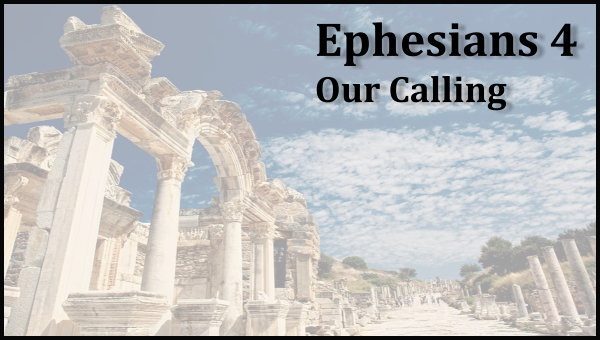By Tyson Thorne

In the first three chapters of Ephesians, Paul had explained how God would unify Jewish and Gentile believers (by creating a new “man,” or ethnic group, 2.11-.22) in Christ. Now in Chapter four Paul directs his attention to defining unity in the body through Christian behavior.
In verse one, Paul exhorts them to walk (live a life) worthy of their calling. The NIV structure for this verse gives the impression that this walk should be on the basis of Paul’s being a prisoner for the Lord. Frequently Paul will use “If…then” statements to prove a point or to give motivation for a certain behavior. For example, “If anyone speaks, then he should do it as one speaking the very words of God” (1 Peter 4.11a). What action is stated following “then” is usually due to the reasoning preceding “then.” In the case of Ephesians 4.1, the NIV structuring of the verse might be understood to say “we are to live a life worthy of the our calling because Paul is a prisoner of the Lord. The Greek, however, does not communicate this. Rather it is, “Therefore [rather than then] I, the prisoner of the Lord, urge you to walk worthy of your calling.” This structure shows Paul’s description of himself as a “prisoner of the Lord” is merely meant to identify himself to the readers (he does the same thing in Ephesians 3.1), and this identification is what gives him the authority to “urge” them to live a certain lifestyle.
The word “worthy” (axioµs) means equal weight; one’s calling and conduct should be in balance. The “calling” refers not only to salvation, but also to one’s union in the body. Therefore a Christian’s walk concerns both his personal life and his responsibility to other believers in the church.
A believer’s attitudes are also important. Paul next lists three attitudes that are to define the believer’s walk. The first of these is humility. In Greek culture, humility was thought of as a vice, to be practiced only by slaves. But Paul stated that saints should be completely humble in their daily walk. There is no room for pride. On the other hand Christians are to avoid false humility, by recognizing who they are in Christ. Christ was the supreme example of humility (Phil. 2:6-8).
Second, a believer is to be gentle or meek (prauteµtos; gentleness, humility, courtesy, considerateness, meekness; early Christian teachings state “the devil is thwarted by humility”). This is the opposite of self-assertion, rudeness, and harshness. It suggests having one’s emotions under control. But it does not suggest weakness. One posible way to define it is, “enduring injury with patience and without resentment.” It is humility, coupled with long-suffering patience and forgiveness.
Third, believers should exhibit patience (makrothymias). Patience is the spirit which never gives up, enduring to the end, even in times of adversity (James 5:10). Rather than self-assertion, it is self-restraint which does not hastily retaliate a wrong.
Attitudes of humility, gentleness, and patience foster unity among Christians. Having stated these three virtues, Paul then stated the manner in which they are to be carried out in one’s conduct: bearing with one another in love and making every effort to keep the unity of the Spirit through the bond of peace. Christians are not to make unity but to keep what God made in creating the “one new man” (Eph. 2:15-16). They are to keep this unity “through the bond” which consists of “peace.” Concern for peace will mean that Christians will lovingly tolerate each other, even when they disagree in the manner in which each has chosen to walk. Which brings us back to verse one:
“…live a life worthy of the calling you have received.”
Brothers and sisters, you have been called out of the world and into the body of Christ. How is your life different? For Moses, the “call” meant leaving his flock of sheep to shepherd a fledgling nation. For Paul the “call” meant leaving his position of power among the Sanhedrin, humbling himself to join in unity with the very people he had persecuted and put to death. What has the “call” meant to you? How has God’s “call” changed your life? Would your life be characterized as humble, gentle and patient by those at your workplace? Is your calling and your conduct in balance? This day, consider these questions. This week, make the changes God reveals to you, and walk “worthy of the calling you have received!”
|
|
